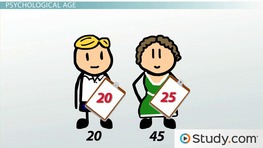Explore Developmental Psychology
Developmental Psychology Courses
These psychology courses focus on studying lifetime development, from childhood to old age. Students interested in developmental theories will find college-level courses that deal with child psychology, developmental stages, and the psychology of aging and death.
Explore our full library of developmental psychology courses:
What is Developmental Psychology?
The definition of developmental psychology means the branch of psychology that examines in detail the mental and physical development of children and how learning and the family environment, or the lack thereof, affect that development on the individual level. Beyond childhood, the discipline seeks to understand the specific ways the mind changes throughout the lifespan, including emotional, behavioral, and cognitive changes, as well as changes in memory and personality. In this way, developmental psychologists use the study of childhood and adolescence, in particular, to bring together research on social, cognitive, and emotional maturation psychology and disorders. For this reason, developmental psychology positions general and educational psychologies on the continuum of applications within the broader discipline.
Like many other applied branches of psychology, developmental psychologists have worked out various theoretical approaches to studying childhood and lifespan development. These include developmental psychology theories that express development as an ordered procession through a series of stages in which the cultivation of multiple abilities transpires, and continuous theories, in which development occurs uniquely and individually, as learning and change acquired throughout the lifespan builds on past experiences.
Developmental researchers tend to take one of several approaches:
- Biological — Psychologists cannot study unobservable immeasurable mental processes, so the focus of their research must be on behavior. Behaviors are learned, not in-born; therefore, both behavior and personality can change if the subject is exposed to new experiences that contradict their initial learning experiences.
- Cognitive — Child development results from a series of mental processes, including decision making, memory, problem-solving, and language, each of which are taught or have a learned component. The processes do not end but grow more elaborate over time, eventually producing an appropriately mature adolescent child.
- Learning — Behavior is learned and can change based on experiences in the wider world. People are capable of learning new behaviors and abandoning others. Therefore there is utility in a system of rewards and punishments to mold behavior and personality over time.
- Psychoanalytic — The human mind contains an unconscious aspect in which instinctual evolutionary drives reside. The relationship between the unconscious and the experiences one has before age 5 or 6 determines and cements the personality. It does not fundamentally change after that.
- Integrative — Perspectives that combine ideas from the other theories; examples include bioecological and sociocultural theories.




